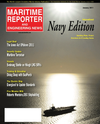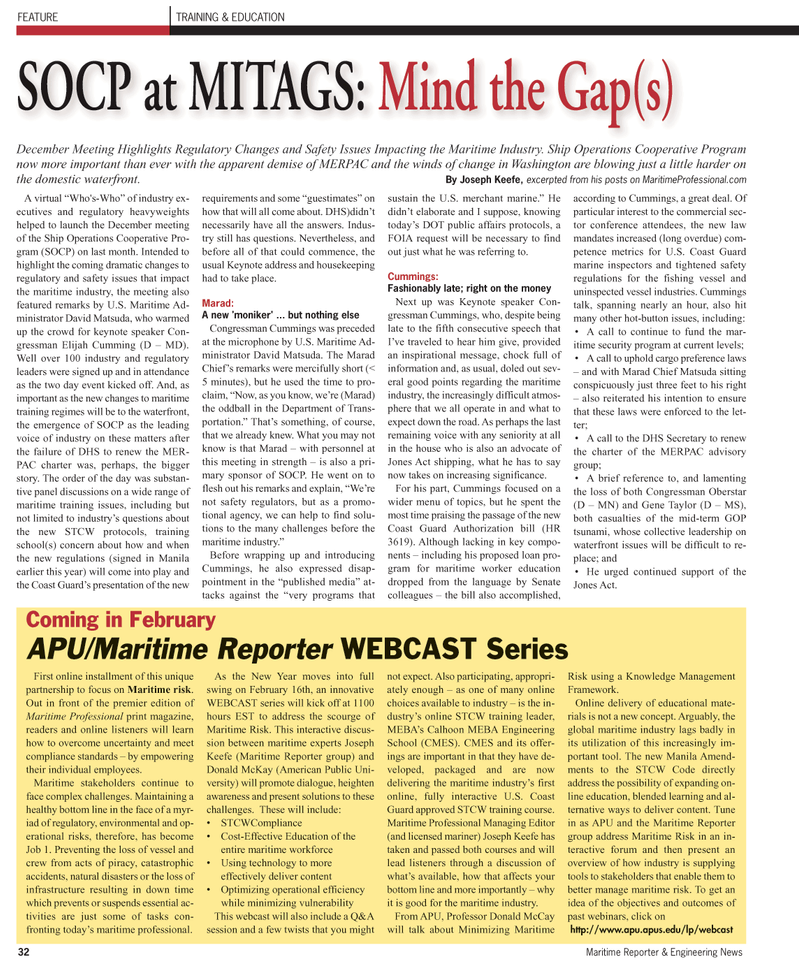
Page 32: of Maritime Reporter Magazine (January 2011)
International Naval Technology
Read this page in Pdf, Flash or Html5 edition of January 2011 Maritime Reporter Magazine
32 Maritime Reporter & Engineering News
FEATURE TRAINING & EDUCATION
A virtual “Who's-Who” of industry ex- ecutives and regulatory heavyweights helped to launch the December meeting of the Ship Operations Cooperative Pro- gram (SOCP) on last month. Intended to highlight the coming dramatic changes to regulatory and safety issues that impact the maritime industry, the meeting also featured remarks by U.S. Maritime Ad- ministrator David Matsuda, who warmed up the crowd for keynote speaker Con- gressman Elijah Cumming (D – MD).
Well over 100 industry and regulatory leaders were signed up and in attendance as the two day event kicked off. And, as important as the new changes to maritime training regimes will be to the waterfront, the emergence of SOCP as the leading voice of industry on these matters after the failure of DHS to renew the MER-
PAC charter was, perhaps, the bigger story. The order of the day was substan- tive panel discussions on a wide range of maritime training issues, including but not limited to industry’s questions about the new STCW protocols, training school(s) concern about how and when the new regulations (signed in Manila earlier this year) will come into play and the Coast Guard’s presentation of the new requirements and some “guestimates” on how that will all come about. DHS)didn’t necessarily have all the answers. Indus- try still has questions. Nevertheless, and before all of that could commence, the usual Keynote address and housekeeping had to take place.
Marad:
A new 'moniker' ... but nothing else
Congressman Cummings was preceded at the microphone by U.S. Maritime Ad- ministrator David Matsuda. The Marad
Chief’s remarks were mercifully short (< 5 minutes), but he used the time to pro- claim, “Now, as you know, we’re (Marad) the oddball in the Department of Trans- portation.” That’s something, of course, that we already knew. What you may not know is that Marad – with personnel at this meeting in strength – is also a pri- mary sponsor of SOCP. He went on to flesh out his remarks and explain, “We’re not safety regulators, but as a promo- tional agency, we can help to find solu- tions to the many challenges before the maritime industry.”
Before wrapping up and introducing
Cummings, he also expressed disap- pointment in the “published media” at- tacks against the “very programs that sustain the U.S. merchant marine.” He didn’t elaborate and I suppose, knowing today’s DOT public affairs protocols, a
FOIA request will be necessary to find out just what he was referring to.
Cummings:
Fashionably late; right on the money
Next up was Keynote speaker Con- gressman Cummings, who, despite being late to the fifth consecutive speech that
I’ve traveled to hear him give, provided an inspirational message, chock full of information and, as usual, doled out sev- eral good points regarding the maritime industry, the increasingly difficult atmos- phere that we all operate in and what to expect down the road. As perhaps the last remaining voice with any seniority at all in the house who is also an advocate of
Jones Act shipping, what he has to say now takes on increasing significance.
For his part, Cummings focused on a wider menu of topics, but he spent the most time praising the passage of the new
Coast Guard Authorization bill (HR 3619). Although lacking in key compo- nents – including his proposed loan pro- gram for maritime worker education dropped from the language by Senate colleagues – the bill also accomplished, according to Cummings, a great deal. Of particular interest to the commercial sec- tor conference attendees, the new law mandates increased (long overdue) com- petence metrics for U.S. Coast Guard marine inspectors and tightened safety regulations for the fishing vessel and uninspected vessel industries. Cummings talk, spanning nearly an hour, also hit many other hot-button issues, including: • A call to continue to fund the mar- itime security program at current levels; • A call to uphold cargo preference laws – and with Marad Chief Matsuda sitting conspicuously just three feet to his right – also reiterated his intention to ensure that these laws were enforced to the let- ter; • A call to the DHS Secretary to renew the charter of the MERPAC advisory group; • A brief reference to, and lamenting the loss of both Congressman Oberstar (D – MN) and Gene Taylor (D – MS), both casualties of the mid-term GOP tsunami, whose collective leadership on waterfront issues will be difficult to re- place; and • He urged continued support of the
Jones Act.
SOCP at MITAGS: Mind the Gap(s)
December Meeting Highlights Regulatory Changes and Safety Issues Impacting the Maritime Industry. Ship Operations Cooperative Program now more important than ever with the apparent demise of MERPAC and the winds of change in Washington are blowing just a little harder on the domestic waterfront. By Joseph Keefe, excerpted from his posts on MaritimeProfessional.com
Coming in February
APU/Maritime Reporter WEBCAST Series
First online installment of this unique partnership to focus on Maritime risk.
Out in front of the premier edition of
Maritime Professional print magazine, readers and online listeners will learn how to overcome uncertainty and meet compliance standards – by empowering their individual employees.
Maritime stakeholders continue to face complex challenges. Maintaining a healthy bottom line in the face of a myr- iad of regulatory, environmental and op- erational risks, therefore, has become
Job 1. Preventing the loss of vessel and crew from acts of piracy, catastrophic accidents, natural disasters or the loss of infrastructure resulting in down time which prevents or suspends essential ac- tivities are just some of tasks con- fronting today’s maritime professional.
As the New Year moves into full swing on February 16th, an innovative
WEBCAST series will kick off at 1100 hours EST to address the scourge of
Maritime Risk. This interactive discus- sion between maritime experts Joseph
Keefe (Maritime Reporter group) and
Donald McKay (American Public Uni- versity) will promote dialogue, heighten awareness and present solutions to these challenges. These will include: • STCWCompliance • Cost-Effective Education of the entire maritime workforce • Using technology to more effectively deliver content • Optimizing operational efficiency while minimizing vulnerability
This webcast will also include a Q&A session and a few twists that you might not expect. Also participating, appropri- ately enough – as one of many online choices available to industry – is the in- dustry’s online STCW training leader,
MEBA’s Calhoon MEBA Engineering
School (CMES). CMES and its offer- ings are important in that they have de- veloped, packaged and are now delivering the maritime industry’s first online, fully interactive U.S. Coast
Guard approved STCW training course.
Maritime Professional Managing Editor (and licensed mariner) Joseph Keefe has taken and passed both courses and will lead listeners through a discussion of what’s available, how that affects your bottom line and more importantly – why it is good for the maritime industry.
From APU, Professor Donald McCay will talk about Minimizing Maritime
Risk using a Knowledge Management
Framework.
Online delivery of educational mate- rials is not a new concept. Arguably, the global maritime industry lags badly in its utilization of this increasingly im- portant tool. The new Manila Amend- ments to the STCW Code directly address the possibility of expanding on- line education, blended learning and al- ternative ways to deliver content. Tune in as APU and the Maritime Reporter group address Maritime Risk in an in- teractive forum and then present an overview of how industry is supplying tools to stakeholders that enable them to better manage maritime risk. To get an idea of the objectives and outcomes of past webinars, click on http://www.apu.apus.edu/lp/webcast

 31
31

 33
33
